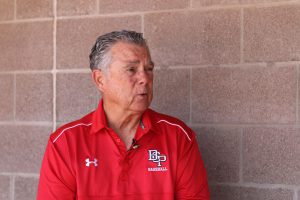- Slug: Sports-Arizona MLB draft, 1200 words
- has sidebar: Sports-Morell here
- Photos below
- map embed code in story
By Trisha Garcia
Cronkite News
PHOENIX — By the time the Milwaukee Brewers selected former Brophy Preparatory Academy third baseman Chad McClanahan in the 11th round of the 2016 MLB First-Year Player Draft last month, McClanahan had begun to think his name might never be called.
“Once we got past the second and third round I started to think, ‘well they might just not draft me,’” McClanahan said.
For most high school baseball players in the state of Arizona, they will never get the call that McClanahan got during the 2016 MLB First-Year Player Draft.
The six-foot-five former ASU baseball commit is one of 28 players selected in the draft that attended high school in Arizona. That group only represents two percent of all the athletes drafted this year.
“When you talk about baseball population, Arizona is known for baseball because of the Major League Spring Training,” said Ryan Cougill, head baseball coach at Yavapai Junior College, which produced current MLB players Kole Calhoun (Los Angeles Angels) and Ken Giles (Houston Astros) and former MLB pitcher Curt Schilling.
“But when you take into account California, Texas, Florida and the number of schools, both high school and four-year schools, it’s overwhelmingly low on the Arizona end.”
California had more than 200 draft picks, Texas and Florida had around 130 each, but even that is almost five times more than the 28 players drafted out of Arizona.
However, in terms of draft picks by population, each of the states listed varies between four and six draft picks per 10,000 residents. Arizona is slightly on the lower end of that scale, while Texas and California average around five and Florida averages around six.
The population in Arizona is significantly lower than the draft-leading states, the state prides itself on the baseball community and the growth of high school programs.
script type=’text/javascript’ src=’https://public.tableau.com/javascripts/api/viz_v1.js’></script><div class=’tableauPlaceholder’ style=’width: 1000px; height: 537px;’><noscript><a href=’#’><img alt=’Sheet 2 ‘ src=’https://public.tableau.com/static/images/Dr/DraftPicksPerCapita/Sheet2/1_rss.png’ style=’border: none’ /></a></noscript><object class=’tableauViz’ width=’1000′ height=’537′ style=’display:none;’><param name=’host_url’ value=’https%3A%2F%2Fpublic.tableau.com%2F’ /> <param name=’site_root’ value=” /><param name=’name’ value=’DraftPicksPerCapita/Sheet2′ /><param name=’tabs’ value=’no’ /><param name=’toolbar’ value=’yes’ /><param name=’static_image’ value=’https://public.tableau.com/static/images/Dr/DraftPicksPerCapita/Sheet2/1.png’ /> <param name=’animate_transition’ value=’yes’ /><param name=’display_static_image’ value=’yes’ /><param name=’display_spinner’ value=’yes’ /><param name=’display_overlay’ value=’yes’ /><param name=’display_count’ value=’yes’ /><param name=’showTabs’ value=’y’ /></object></div>
“There’s a lot to say about the type of baseball played in the state of Arizona,” said Tom Succow, head baseball coach at Brophy Prep. “I think the unfortunate part is we don’t have enough [universities] to fit the needs of all the players coming out of the state of Arizona, so some of them choose to go elsewhere.”
The state of Arizona has three universities with baseball teams: the University of Arizona, Arizona State and Grand Canyon University – all NCAA Division I schools. But, the high school programs developing in the state have given local coaches a reason to believe that Arizona can compete with larger states.
“Arizona high school baseball is some of the most competitive in the country,” said Ryan Dyer, head baseball coach at North Canyon High School, whose Juan Cabrera became the first ever draft pick out of that school. “When we match up our best programs with those best programs, we can battle with them day in and day out.”
Dyer pointed to the annual Sunbelt Classic in Oklahoma, where 10 teams face off in a high school all-star baseball classic from across the United States and Canada. The 10 teams this year include Arizona, Canada, Colorado, Georgia, Mississippi, Missouri, Oklahoma Blue, Oklahoma Gold, Texas and Tennessee, according to the Sunbelt Classic website.
Team Arizona took third place for the second consecutive year. Team Arizona has won the tournament twice in 2008 and 2013.
Though California isn’t one of the states that competes in the Sunbelt Classic, it does send teams and players to some of the largest baseball tournaments in Arizona, like the Coach Bob Invitational and the Arizona Baseball Showcase, among others.
“We don’t have the population those states have, so maybe they have more depth,” Dyer said. “But I think player for player we can hang with anybody.”
Teams from Arizona won two of the five division tournaments in the Coach Bob National Invitational in 2016 and came in second in two more, including beating out a team from southern California for the American Division title.
The Coach Bob Invitational, according to its website, is a national tournament named after Bob Weinheimer, a former Hall of Fame high school baseball coach from Chandler High School and Boulder Creek High School.
Arizona also hosts a baseball showcase which gives high school athletes the opportunity to be seen by college and professional teams for recruiting and scouting, according to the baseball showcase website.
“Arizona has made its mark in amateur baseball and I think the type of quality coming out of high school baseball in Arizona is outstanding,” Succow said.
Though the quantity of quality wasn’t as strong in the 2016 draft, some coaches feel that Arizona’s talent pool is on the rise.
“It varies from year to year actually. Next year will probably be more draft picks than this year, out of Arizona high schools anyway,” said Eric Kibler, head baseball coach at Horizon High School which has produced current MLB players Tuffy Gosewisch (Arizona Diamondbacks) and Tommy Joseph (Philadelphia Phillies). “In Arizona it’s getting better every year as far as [the number of draft picks], I think it could get a lot better though.”
Each coach attributed the growing success of high school baseball in the state of Arizona to continued traditions passed from long-time coaches to players who become coaches, as well as stable programs and upgraded facilities. But, that didn’t stop them from thinking ahead and hoping to make more improvements as their baseball programs move forward.
“I think Arizona needs to do better as far as expanding the game a little bit and teaching it maybe better. But California, Texas and Florida will probably, because of population, will probably always have most guys in the draft,” Kibler said. “But Arizona holds its own as far as population and we have good players here.”
Among those good players are recent, local major-leaguers like Gosewisch, a catcher for the Diamondbacks and Jake Barrett, a relief pitcher for the D-backs.
Gosewisch attended Horizon High School in Scottsdale and Barrett attended Desert Ridge High School in Mesa.
Barrett shared his sentiments on Arizona’s baseball programs and the value they’ve had in his career.
“I think just being in the state of Arizona, there’s a lot of travel ball growing up, and there’s a lot of high schools in the area that have really good baseball competition,” Barrett said. “The more I practiced, the more I played, the better I got and the competition in Arizona alone got better.”
For Gosewisch, it wasn’t just the programs in his home state, but the coaches, like Kibler, that helped him reach the major leagues.
“I think he set the foundation for my baseball career along with my parents,” Gosewisch said. “He’s just been a huge influence on so many high school kids careers (because) a lot of guys have gone on to play college baseball and a good amount have gone on to play professional baseball and I think he was a big part of that.”
Veteran coaches and further developing high school programs in the state of Arizona have already produced major-league caliber athletes, but the faith local coaches have in their programs and teams only give them reason to believe that the state is a rising force in national baseball competition.
Cronkite News reporters Michael Boylan, Giselle Cancio and Lindsey Wisniewski contributed to this story.

